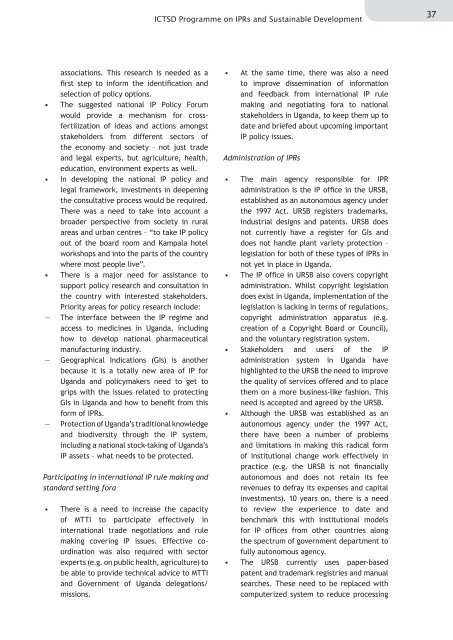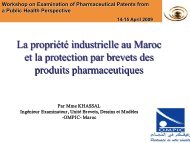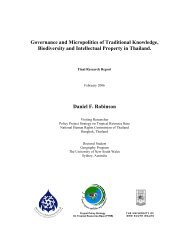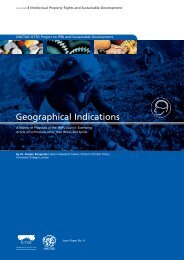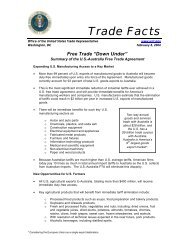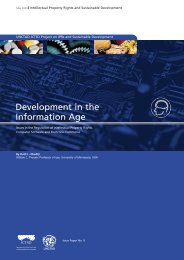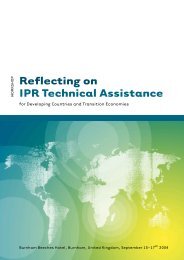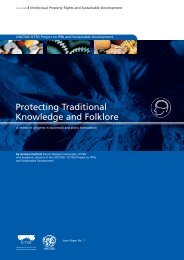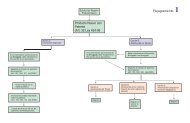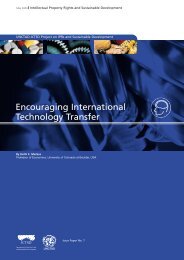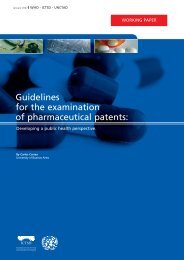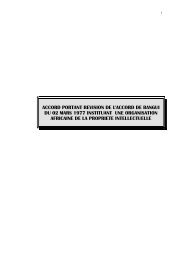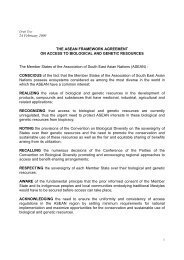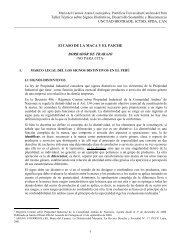Final Report of Uganda Intellectual Property ... - IPRsonline.org
Final Report of Uganda Intellectual Property ... - IPRsonline.org
Final Report of Uganda Intellectual Property ... - IPRsonline.org
You also want an ePaper? Increase the reach of your titles
YUMPU automatically turns print PDFs into web optimized ePapers that Google loves.
ICTSD Programme on IPRs and Sustainable Development<br />
37<br />
associations. This research is needed as a<br />
first step to inform the identification and<br />
selection <strong>of</strong> policy options.<br />
• The suggested national IP Policy Forum<br />
would provide a mechanism for crossfertilization<br />
<strong>of</strong> ideas and actions amongst<br />
stakeholders from different sectors <strong>of</strong><br />
the economy and society – not just trade<br />
and legal experts, but agriculture, health,<br />
education, environment experts as well.<br />
• In developing the national IP policy and<br />
legal framework, investments in deepening<br />
the consultative process would be required.<br />
There was a need to take into account a<br />
broader perspective from society in rural<br />
areas and urban centres – “to take IP policy<br />
out <strong>of</strong> the board room and Kampala hotel<br />
workshops and into the parts <strong>of</strong> the country<br />
where most people live”.<br />
• There is a major need for assistance to<br />
support policy research and consultation in<br />
the country with interested stakeholders.<br />
Priority areas for policy research include:<br />
―― The interface between the IP regime and<br />
access to medicines in <strong>Uganda</strong>, including<br />
how to develop national pharmaceutical<br />
manufacturing industry.<br />
―― Geographical Indications (GIs) is another<br />
because it is a totally new area <strong>of</strong> IP for<br />
<strong>Uganda</strong> and policymakers need to get to<br />
grips with the issues related to protecting<br />
GIs in <strong>Uganda</strong> and how to benefit from this<br />
form <strong>of</strong> IPRs.<br />
―― Protection <strong>of</strong> <strong>Uganda</strong>’s traditional knowledge<br />
and biodiversity through the IP system,<br />
including a national stock-taking <strong>of</strong> <strong>Uganda</strong>’s<br />
IP assets – what needs to be protected.<br />
Participating in international IP rule making and<br />
standard setting fora<br />
• There is a need to increase the capacity<br />
<strong>of</strong> MTTI to participate effectively in<br />
international trade negotiations and rule<br />
making covering IP issues. Effective coordination<br />
was also required with sector<br />
experts (e.g. on public health, agriculture) to<br />
be able to provide technical advice to MTTI<br />
and Government <strong>of</strong> <strong>Uganda</strong> delegations/<br />
missions.<br />
• At the same time, there was also a need<br />
to improve dissemination <strong>of</strong> information<br />
and feedback from international IP rule<br />
making and negotiating fora to national<br />
stakeholders in <strong>Uganda</strong>, to keep them up to<br />
date and briefed about upcoming important<br />
IP policy issues.<br />
Administration <strong>of</strong> IPRs<br />
• The main agency responsible for IPR<br />
administration is the IP <strong>of</strong>fice in the URSB,<br />
established as an autonomous agency under<br />
the 1997 Act. URSB registers trademarks,<br />
industrial designs and patents. URSB does<br />
not currently have a register for GIs and<br />
does not handle plant variety protection –<br />
legislation for both <strong>of</strong> these types <strong>of</strong> IPRs in<br />
not yet in place in <strong>Uganda</strong>.<br />
• The IP <strong>of</strong>fice in URSB also covers copyright<br />
administration. Whilst copyright legislation<br />
does exist in <strong>Uganda</strong>, implementation <strong>of</strong> the<br />
legislation is lacking in terms <strong>of</strong> regulations,<br />
copyright administration apparatus (e.g.<br />
creation <strong>of</strong> a Copyright Board or Council),<br />
and the voluntary registration system.<br />
• Stakeholders and users <strong>of</strong> the IP<br />
administration system in <strong>Uganda</strong> have<br />
highlighted to the URSB the need to improve<br />
the quality <strong>of</strong> services <strong>of</strong>fered and to place<br />
them on a more business-like fashion. This<br />
need is accepted and agreed by the URSB.<br />
• Although the URSB was established as an<br />
autonomous agency under the 1997 Act,<br />
there have been a number <strong>of</strong> problems<br />
and limitations in making this radical form<br />
<strong>of</strong> institutional change work effectively in<br />
practice (e.g. the URSB is not financially<br />
autonomous and does not retain its fee<br />
revenues to defray its expenses and capital<br />
investments). 10 years on, there is a need<br />
to review the experience to date and<br />
benchmark this with institutional models<br />
for IP <strong>of</strong>fices from other countries along<br />
the spectrum <strong>of</strong> government department to<br />
fully autonomous agency.<br />
• The URSB currently uses paper-based<br />
patent and trademark registries and manual<br />
searches. These need to be replaced with<br />
computerized system to reduce processing


